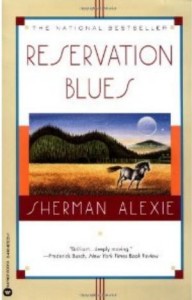Alexie, Sherman (1995). Reservation Blues. New York: Warner Books. 306 pages.
Chapter 1 starts with the line, “In the one hundred and eleven years since the creation of the Spokane Indian Reservation in 1881, not one person, Indian or otherwise, had ever arrived there by accident.”
That line sums the theme of Reservation Blues. It’s a heartfelt confession of a reservation Indian boy and his comrades. Alexie is now very much an “urban Indian,” of course, a world-renown and much-honored writer. But this book tries to show what life on the reservation was like, and still is like, for many people.
The opening imagery is fantastic, and sets the tone. Robert Johnson, legendary blues guitarist, is standing at a crossroads on the reservation. The young protagonist and narrator, Thomas Builds-the-Fire finds him there. Johnson seems sick and hurt, and Thomas offers to take him to Big Mom, an enormous Indian woman who lives in a cabin atop a mountain. Johnson believes that would be a good idea because he has had dreams of such a woman, someone who could reverse the bargain he made with the devil, selling his soul in exchange for his otherwordly ability to play the guitar.
The episode refers to the Faustian “Crossroads Legend” around Johnson (who died in 1938 at age 27): He met the devil at a crossroads (in Mississippi), and made the deal. The devil tuned his guitar for him and Johnson became a great player.
Keying off this opening scene, Johnson gives Thomas his magical guitar; Thomas gives it to his friend Victor, a drunken lout who suddenly, though intermittently, becomes able to play fantastic blues. They recruit another friend, Junior, and form a band, Coyote Springs. Thomas is the bass player and the “story-teller” (songwriter). They’re a terrible band, but the Indians on the rez appreciate their play in an abandoned grocery store.
The boys get an audition with a record label in New York. The talent scouts, Wright and Sheridan, buy the airline tickets for the band, which now includes two young Indian women (named Chess and Checkers), who were groupies but joined as backup singers.
It’s worth noting that “Wright” is the name of the U.S. Cavalry officer who led the 1858 Indian Wars campaign that defeated the Spokane Indians, and “Sheridan” is the U.S. Army officer who famously declared that ‘The only good Indian is a dead Indian.’ Alexie is fond of inserting cultural and historical references into his tale.
So Coyote Springs goes to the Big Apple, but the audition becomes a disaster when the magical guitar “turns” on Victor, attacking him. The group returns to the rez, but the tribe resents and rejects them for having left at all. Why did they try to sell their souls to the whites? Who did they think they were, attempting to have a successful life off the reservation? The mood turns dark.
The story line explores and demonstrates these larger themes: What is the Indian soul? Why do Indians, even today, still see the white man as the devil? What are the roles of music and storytelling, and dreaming in the Indian cultural life? The novel tries to present a world view from the point of view of a young reservation Indian, Thomas, who is educated, sensitive, and thoughtful, and who doesn’t drink. Thomas is Alexie’s alter-ego.
I enjoyed a couple of conversations with Alexie at the 2008 Port Townsend, WA film festival, which focused on films by and about Indians (He was the festival’s “official Indian,” he joked).
“Poverty is boring,” he said. “I was poor, and when you’re poor, it’s the same fears and worries and problems every day. It’s like being in prison. There is no time.” It echoes the last line of the novel’s theme song, Reservation Blues, echo for me: “And if you ain’t got choices, Ain’t got much to lose.”
I asked him about the lack of ambition that seems to inhabit reservation culture and Indian life. He replied, “To have ambition means to accept the world of the people who destroyed you. Lack of ambition, even alcohol and drug addiction and suicide, are acts of rebellion against that.” I was skeptical. “Are people really thinking that way?” I asked. “Subconsciously,” he answered, “always.”
I believed him, because I believe him. I’m white; I’m the devil. I offer the magic guitar of opportunity that promises hope but will turn on you and attack you. From my culture-centric point of view, it’s hard to understand the racism and cultural and economic forces that keep the Indian wars going even today. This book successfully represents that and does it with engaging, likeable characters, stimulating imagery, original and sincere writing, and amazingly, with a light, humorous tone. It’s an artistic masterpiece.

